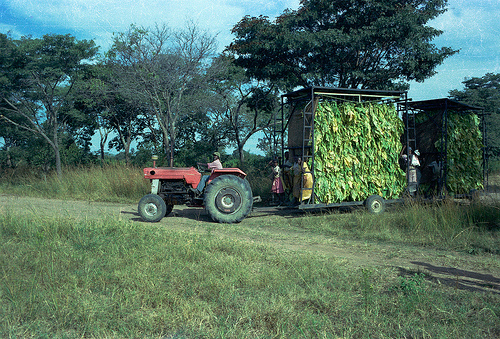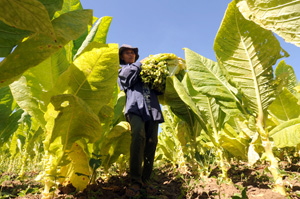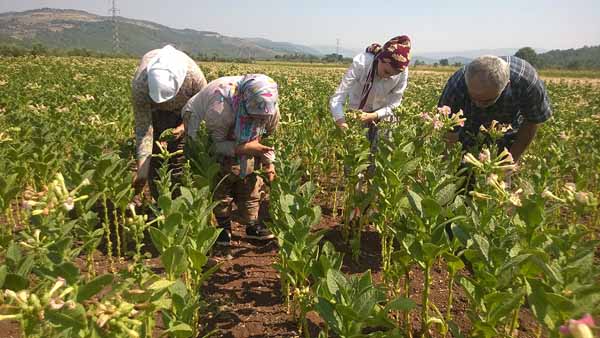Disturbing patterns of child exploitation pervade the tobacco fields of Africa, leaving young people in rural areas poisoned for life while tobacco brands fuel the world’s deadliest habit, according to a story by Michelle Chen for the Nation, citing Human Rights Watch (HRW) research.
Through field research during 2017, HRW investigators were said to have discovered that children 12-17 years old were regularly employed during the harvesting and processing seasons in Zimbabwe, and that workers of all ages were ‘pushed to work excessive hours without overtime compensation, denied their wages, and forced to go weeks or months without pay’.
Young people were particularly vulnerable, reported Chen, because tobacco picking was not officially regulated as dangerous work for children in the country, despite the clear health and social threats linked to child farm labor.
Although multinational corporations bore special responsibility for labor violations, which hit both wage laborers and smallholder farmers, HRW said ‘the government and tobacco companies are failing to ensure that workers have sufficient information, training, and equipment to protect themselves’.
Chen reported that, unlike in countries such as Brazil and Indonesia, which had made strides in eradicating child labor, in Zimbabwe such exploitation remained an open secret because of corruption and incompetent regulation.
Category: People

Child labor an 'open secret'

Workshop places limited
The Inter-University Consortium for Political and Social Research (ICPSR) is due to host a Population Assessment of Tobacco and Health (PATH) Study Data User Workshop on Biomarker Restricted-Use Files, according to a note issued by the US Food and Drug Administration’s Center for Tobacco Products (CTP).
The workshop will be held at the ICPSR in Ann Arbor, Michigan, US, on August 13-14.
‘The workshop will introduce participants to the PATH Study, focusing on the study design, data collection procedures, adult instrument, and variables,’ the note said.
‘With this information, participants will be able to formulate research questions appropriate for the PATH Study biomarker data.
‘In addition, participants will gain a thorough understanding of the content and organization of the biomarker data files, interview data files, and weighting files.
‘Participants will also gain knowledge and hands-on experience in linking biomarker data files with interview data files and weighting files, as well as in working with the data and understanding the weighted results.’
The CTP said the workshop was free to attend, but that admission was competitive and that applications were due by Friday, May 18.
Following the money
Four municipalities in the Ilocos region of the Philippines that, during the past two years, received the biggest shares from tobacco excise taxes have failed to publicly disclose how the funds are being spent, in violation of budget rules, according to a major Vera Files story by Maria Feona Imperial, Lucille Sodipe and Jake Soriano, published in the Philippine Star.
Candon City, the municipalities of Cabugao and Santa Cruz in Ilocos Sur, and Balaoan in La Union reportedly each received more than a billion pesos in tobacco excise taxes since 2016 but failed to comply with Department of Budget and Management (DBM) memoranda reporting requirements.
LGUs [Local Government Units] that benefit from excise taxes are required to prepare quarterly reports on fund utilization and the status of projects, following a prescribed format. These reports are to be posted within 20 days after every quarter on the LGUs’ websites, and in at least three conspicuous public places.
Two laws, Republic Act 7171 and RA 8240, later amended by RA 10351, provide tobacco-producing local governments 15 percent of total excise taxes collected annually on the sale of tobacco products.
Local governments’ shares in these taxes, which are earmarked to ‘advance the self-reliance of tobacco farmers’, have risen to more than P41 billion since 2016, an election year, when the national government started releasing a windfall of excise tax shares after the sin tax reform law, which imposed higher taxes on cigarettes.
Prior to 2016, the funds were channeled through lawmakers, a scheme that the Supreme Court declared unconstitutional due to post-enactment intervention in the implementation of the national budget.
The budget releases were since accompanied with guidelines on the use of funds and ’emphasized the concomitant posting and reporting (of) requirements to enhance transparency and accountability’.
Yet VERA Files said that it had found that the top recipients of tobacco excise tax shares since 2016 had failed to comply with the DBM’s reporting requirements.
Reports showed also that proceeds from the taxes were being used to fund projects that did not directly benefit tobacco farmers.
Budget Secretary Benjamin Diokno, in an interview with VERA Files, said noncompliance could be grounds for administrative action, including suspension from office.
Call for e-cig standards
The EU should rethink its ban on tobacco-products advertising because consumers need more information about how electronic cigarettes are much less harmful than are combustible cigarettes, and how the former could help them quit the latter, according to an opinion piece in the Parliament Magazine by the MEP Laima Andrikienė, who is a member of the EU Parliament’s international trade committee.
The Parliament Magazine has run a series of opinion pieces written by people advocating the imposition of e-cigarette standards, and much of Andrikienė’s piece was about the need for such standards.
She said that thousands of counterfeit products entered the EU market without any safety checks and in violation of the EU’s trade rules. These included all kinds of products, from toys, electrical devices, medicines, to cosmetics and tobacco.
Tobacco producers, she said, faced significant problems regarding the illegal trade. Novel tobacco products and e-cigarettes differed from conventional tobacco products in many ways, and there were many new products available on the market.
‘In general, a large variety of similar products is a good thing for consumers, but it is important to know if regulators are prepared for this level of complexity,’ she said. ‘What we know for sure is that there is no compliance structure in place at EU level.’
Andrikienė said that protecting consumers and ensuring products were safe – particularly those brought in from third countries – remained problematic and required urgent attention at EU level.
Safety started with standards, she said, and the European committee for standardisation was working on the issue. However, the process of standardisation was slow and further efforts by all EU member states were needed.
Altria to webcast meeting
The Altria Group is due to host a live audio webcast of its 2018 Annual Meeting of Shareholders starting at 09.00 Eastern Time on May 17.
The webcast will be in a listen-only mode and pre-event registration is necessary through www.altria.com/webcasts.
An archived copy of the webcast will be made available on altria.com or through the Altria Investor App. The free app is available for download at www.altria.com/irapp or through the Apple App Store or Google Play.
Market lacks logic
The Zimbabwe auction market for flue-cured tobacco defies logic, according to a story by the associate editor of the Manica Post, Obert Chifamba.
Chifamba pointed out that the highest price paid on March 21, the first day of the 2018 marketing season, was US$4.90 per kg.
Of course, he said, many farmers would deliver primings and most of their early-harvested leaves on the first day, which did not necessarily reflect the quality of the crop in its entirety. The best quality tobacco usually found its way to the floors sometime later in the course of the marketing season.
It was obvious that the highest-quality leaf should fetch the highest prices of the season and, logically, those prices had to be higher than the $4.90 recorded on the first day. Yet the sad reality seemed to suggest that as the quality got better, the prices either took a tumble or hit a ceiling – a ceiling of steel or granite.
This price ceiling had in the recent past been the farmers’ biggest undoing. It had driven most farmers to think twice about producing the crop, though most had been unable to make that decision because tobacco was the most rewarding crop at the moment.
The farmers had had to swallow the bitter pill of disappointment and go back to the field year-in, year-out.
The farmers were always driven by the hope that the time for cartels might be nigh, and the fact that they didn’t want to miss out when this eventually happened.
‘Quite a gamble!’ Chifamba said. ‘On the ground the odds have always remained stacked heavily against them.’
Funding issue festers
The International Labour Organization’s director-general said on Tuesday that he hoped the UN agency would, by the end of this year, resolve the issue of whether or not it should cut ties with the tobacco industry, according to an Agence France Presse story.
“We will be returning to this issue when our governing body next meets in November … and hopefully we can come up with an agreement at that point,” Guy Ryder reportedly told AFP in an interview.
The International Labour Organization (ILO), which is the only UN agency to accept money from the tobacco industry, has justified its industry ties as providing a way of helping improve the working conditions of some of the 60 million people involved in tobacco production worldwide.
AFP reported that, since 2002, the ILO had received more than $15 million from Japan Tobacco International and groups linked to some of the world’s biggest tobacco companies for ‘charitable partnerships’ aimed at reducing child labor in tobacco growing.
But some activists and civil society groups have insisted that tobacco-funded programs have little impact in improving workers’ conditions. They argue that a partnership with a major UN agency was allowing tobacco companies to portray themselves as responsible corporate actors even as their products were killing millions of people each year.
AFP said the ILO’s tripartite structure, which included representatives of employers, labor unions and 187 member states, could make it particularly tricky to reach consensus on difficult issues.
“[T]he employers’ group consider that it is legitimate and proper to continue to maintain financial support from the tobacco industry,” said Ryder, who added that the workers were “more hesitant about that, and the governments are divided”.
Tobacco use down
Tobacco use by young people in Guam is declining, according to a story in The Pacific Daily News citing the results of a survey by the Centers for Disease Control & Prevention (CDCP).
The Guam Department of Public Health and Social Services yesterday announced the release of the results of the 2017 survey, which was carried out among Guam students between the ages of 13 and 15.
The latest figures were compared with those of 2014, the most recent previous year in which the CDCP conducted a Global Youth Tobacco Survey on Guam.
In 2014, 27.7 percent of ‘students’ reported using a tobacco product, while, by 2017, that figure had fallen to 21.3 percent.
At the same time, 22.7 percent of students reported smoking tobacco in 2014, compared with 17.2 percent in 2017.
The survey found also that 47.7 percent of the young people surveyed reported they were not prevented from buying tobacco because of their age.
The 2017 survey for the first time recorded the use of electronic cigarettes, and it found that 34.6 percent of those surveyed said they currently used such devices.
The results indicated that 35.9 percent of young males and 32.7 percent of young females said they currently used electronic cigarettes.
Promoting innovation
The European Union needs to promote and protect innovation, research and development, according to MEP Fulvio Martusciello, who is a member of Parliament’s economic and monetary affairs committee.
Writing an opinion piece in the Parliament Magazine, Martusciello said that such a policy would not only send the appropriate positive signals to investors and provide the business community with a dependable space to develop successfully, it would also have a positive impact on high quality employment creation and on consumers’ satisfaction.
‘Vaping products embed significant research and development,’ he said. ‘These are highly innovative products and represent a potentially safer category for consumer use.
‘Relying on the voice of science, regulators should adapt to new developments, respect scientific advice and regulate such innovative products in an appropriate way.’
Martusciello said he was in favour of holding a parliamentary debate on how best to regulate these products in the EU and on how to ensure that appropriate EU standards were in place.
Vapers to have their say
Representatives of the UK’s vaping industry and consumers are due to give evidence later today to the House of Commons’ Select Committee on Science and Technology.
The Committee, made up of a cross-party group of MPs, is scheduled to start its meeting at 17.05.
It has been examining the impact of electronic cigarettes on human health, and, as part of that examination, their effectiveness as a stop-smoking tool.
It has examined also the regulatory landscape.
John Dunne (pictured), director of the UK Vaping Industry Association (UKVIA), will be giving evidence in front of the Committee alongside Fraser Cropper, chairperson of the Independent British Vape Trade Association and Sarah Jakes, chairperson of the New Nicotine Alliance.
“This is a great opportunity to present the industry’s perspective on how regulation impacts the sector on a day to day basis, both the good and the bad,” Dunne was quoted as saying as part of a press note issued by the UKVIA yesterday.
“E-cigarettes are valuable tools which will reduce the number of people smoking conventional cigarettes. Yet, despite the consensus from leading health bodies that vaping is likely to be at least 95 percent less harmful, there is still a huge amount of misinformation out there.
“We are hoping that our evidence … will inform MPs on how they can direct regulation to help us in our mission to inform the 7.6 million smokers in the UK – and the 40 percent of smokers who haven’t even tried it – of the potential health benefits of switching to vaping.”
The UKVIA said the UK had become an early adopter of vaping technologies, with the nation’s smokers keen to adopt an alternative to smoking.
‘By 2012 there were already 700,000 vapers in the UK and in 2017 this figure reached nearly three million people, over half of whom have given up smoking entirely.’










